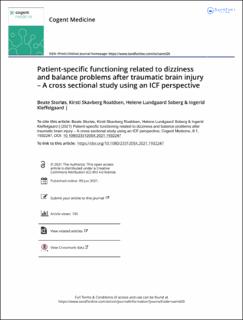Patient-specific functioning related to dizziness and balance problems after traumatic brain injury – A cross sectional study using an ICF perspective
Peer reviewed, Journal article
Published version
Permanent lenke
https://hdl.handle.net/11250/2981644Utgivelsesdato
2021-06-09Metadata
Vis full innførselSamlinger
Originalversjon
https://doi.org/10.1080/2331205X.2021.1932247Sammendrag
To describe patient-specific problems in functioning related to dizziness and balance problems in patients with mild to moderate traumatic brain injury (TBI) in a biopsychosocial context. A cross-sectional study where data from the Patient-Specific Functional Scale (PSFS) was linked to the International Classification of Functioning, Disability and Health (ICF). Data from 60 patients were classified into second-level ICF categories, using the ICF linking rules. The 60 patients included 73% women; mean age, 39 (SD 12.9) years with mild to moderate TBI (mean GCS 14.5, SD 1.3). The patients predominantly reported problems representing the activities and participation components of the ICF; mobility-related problems were most frequently reported by 42%. In addition, vestibulo-ocular and hearing problems, attention functions, domestic activities, recreation, leisure and environmental factors were frequently (≥10%) reported as barriers to functioning. The median severity of problems on the PSFS Numeric Rating Scale (0–10 worst to best) was 3 (IQR 1–5) points. The PSFS provided a unique set of problems in functioning most relevant to each patient resulting in a diversity of functional limitations. The patient-specific problems were all represented in the ICF, supporting a biopsychosocial perspective on problems related to dizziness and balance problems after TBI.

